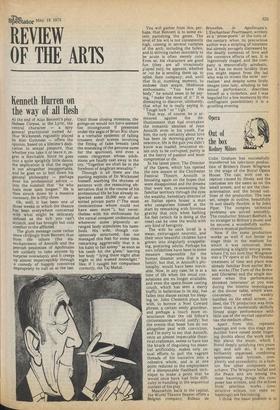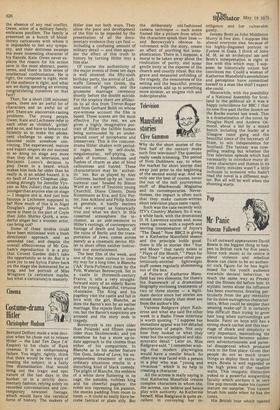Opera
Out of the box
Rodney Milnes
Colin Graham has successfully transferred his television production of Britten's Owen Wingrave to the stage of the Royal Opera House. The cast, with one exception caused by illness, and the costumes are the same as on the small screen, and so are the characterisation and the broad outlines of the production. The new set, simple in outline, beautifully lit and ideally flexible, is by John Piper. The complex technical problems are solved smoothly. The conductor, Steuart Bedford, is no stranger to Britten's music and he secures a wonderfully authoritative musical performance.
Now if the same production works as well if not better on stage than in the medium for which it was conceived, then something is slightly wrong somewhere I'm not sure that Wingrave was a TV opera at all. The flexible treatment of time and place was already familiar from earlier Britten works (The Turn of the Screw and Gloriana) and the single moment when this performance shrieked :television' at you was during the interior monologues at the dinner table, which were,
conversely, rather weakly handled on the small screen; indeed, the TV production was little more than a moderately skilfully filmed stage performance with little use of the myriad opportunities the medium offers.
Apart from this, repeated hearings and now this stage production have raised some lingering doubts about the work itself. Not about the music, which I found deeply satisfying two years ago and still do; it is most brilliantly organised, combining spareness and lyricism, complexity and accessibility, in a fashion few other composers can achieve. The Wingrave ballad and the Peace aria are among the most haunting things the composer has written, and the echoes from previous works (constructive echoes, not mere rehashings) are fascinating.
I think the basic problem is in the absence of any real conflict. Owen, scion of a military family, embraces pacifism. The family is presented as a bunch of bloodthirsty caricatures with whom it is impossible to feel any sympathy, and their dottiness swamps the more interesting character of his fiancee, Kate. Owen never explains the reason for his action save in the most abstract, poetic terms, and there is little sense of intellectual confrontation. He is right, the composer is right, most of the audience is right, and what are we doing spending an evening congratulating ourselves on that fact?
Then, for a short (105 minutes) opera, there are an awful lot of characters and an awful lot of plot. There are alsocertain casting problems. The young people, Owen, Kate and Lech mere refer to each other as 'childish', 'girlish' and so on, and have to behave sufficiently so to make the adolescent challenge to sleep in the haunted room somehow convincing. The experienced, mature and expert singers do not succeed in so doing on stage any more than they did on television, and Benjamin Luxon's decision to play Owen in a beard, which makes him look far older than he really is, is an added hazard. It is no fault of Janice Chapman (deputising strongly for Jennifer Vyvyan as Mrs Julian) that she looks younger than anyone else on stage — I imagine she is. And just how fatuous is Lechmere supposed to be? How much of this is in Nigel Douglas's playing? How much more is there in the part of Coyle than John Shirley Quirk, a wonderful singer but a wooden actor, can bring out?
Some of these doubts could have been minimised with a fresh directional approach and an amended cast, and despite the overall effectiveness of Mr Graham's reproduction it is a pity that Covent Garden didn't take the opportunity so to do. But it is pure joy to see Sylvia Fisher back on the stage she dominated for so long, and her portrait of Miss Wingrave (a caricature maybe, but what a caricature) is masterly.



































 Previous page
Previous page